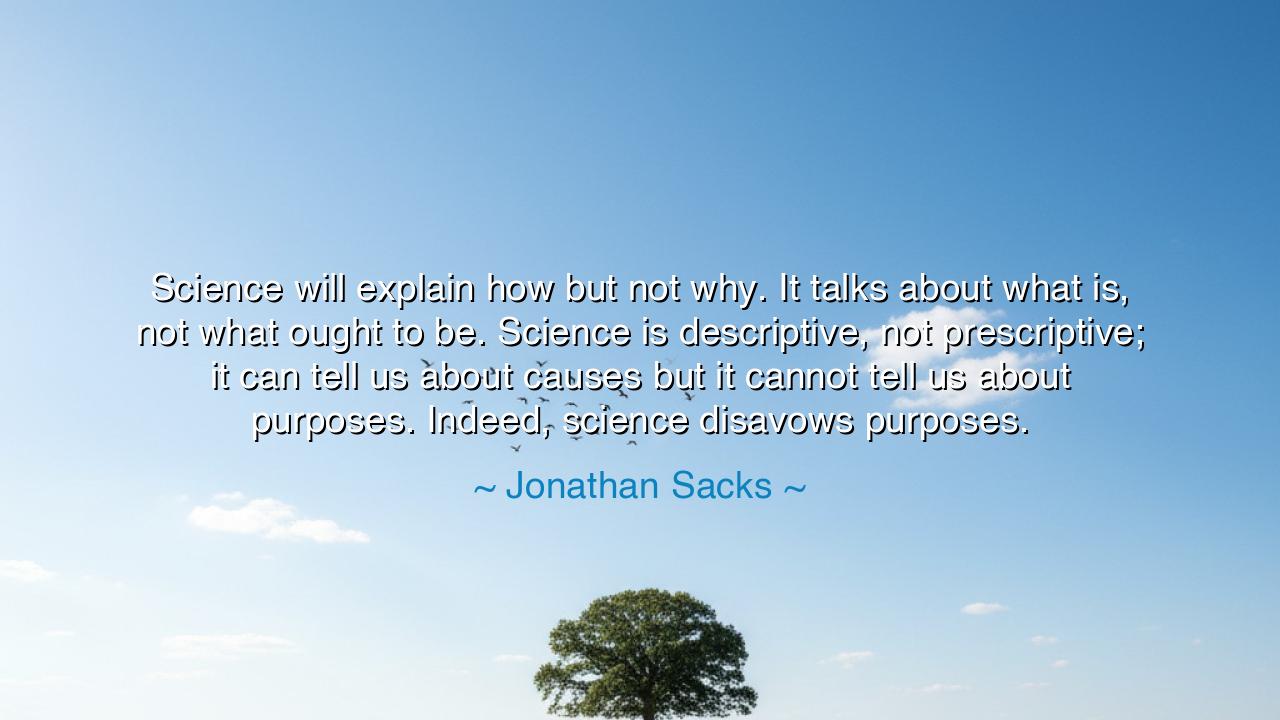
Science will explain how but not why. It talks about what is, not
Science will explain how but not why. It talks about what is, not what ought to be. Science is descriptive, not prescriptive; it can tell us about causes but it cannot tell us about purposes. Indeed, science disavows purposes.






“Science will explain how but not why. It talks about what is, not what ought to be. Science is descriptive, not prescriptive; it can tell us about causes but it cannot tell us about purposes. Indeed, science disavows purposes.” Thus spoke Jonathan Sacks, a sage of our time, who sought to weave together faith, reason, and the eternal questions of man. In these words, he sets before us a boundary and a warning: science is mighty in its reach, but it is not sovereign over every domain. It can reveal the structure of the universe, but it cannot reveal the meaning of the universe. It can tell us the causes of lightning, but not the purpose of light itself in the human journey.
The origin of this reflection lies in the great debates of the modern world, where men often mistake the tools of science for the answers of philosophy, or the revelations of physics for the wisdom of the soul. From Galileo to Darwin to Einstein, each new discovery has expanded our vision of the cosmos, yet none have silenced the question: “Why are we here?” The telescope shows us galaxies without number, yet cannot say why existence matters. The microscope reveals the dance of cells and atoms, yet does not tell us how to live with justice and love. Sacks reminds us that science is a lamp to see the world, but not a compass to guide the heart.
Consider the example of the splitting of the atom. Science showed us the “how”—the mechanics of fission, the release of energy from the heart of matter. But when the atom was split at Los Alamos, mankind was faced with a question science could not answer: “Should we use this power?” The mushroom clouds over Hiroshima and Nagasaki revealed the danger of confusing explanation with wisdom. Science gave the cause; only moral vision could determine the purpose. Here we see the sharp truth of Sacks’s words: without a guiding “why,” the “how” may lead to ruin.
The ancients understood this division well. The philosophers of Greece asked not only about the nature of things, but also about the good life, the just society, the purpose of existence. Aristotle studied biology and logic, but he also sought the telos—the final purpose—for which man is made. Likewise, in the East, sages such as Confucius taught that knowledge without virtue is dangerous, that learning must be joined with morality. Science speaks of the stars, but wisdom asks, “What do the stars mean for us?” It is in this union of knowledge and purpose that civilizations endure.
Sacks’s teaching is both humbling and liberating. It humbles us, for it reminds us that no matter how vast our technology or precise our measurements, there remain questions we cannot answer with instruments or formulas. But it also liberates us, for it restores dignity to the realms of ethics, philosophy, art, and faith. These too are ways of knowing, ways of grasping the “ought” where science stops at the “is.” Together, they form the whole vision of man—the rational and the moral, the descriptive and the purposeful.
Therefore, O listener, do not despise science, but neither worship it as an idol. Use it to learn the causes of things, to heal, to build, to understand. But when you seek meaning, turn also to wisdom, to community, to the teachings of those who wrestled with the eternal “why.” For a life built only on explanations is clever but hollow; a life guided by purpose is radiant and enduring.
Practical is the way forward: in your daily choices, ask not only “How does this work?” but “Why should I do it?” Do not mistake knowledge for virtue, nor information for wisdom. Cultivate both the clarity of the scientist and the depth of the sage. In this way, your life will be whole, and your journey aligned not only with the mechanics of the world, but with the higher call of meaning. For as Jonathan Sacks teaches, science disavows purposes, but the human spirit cannot live without them.






AAdministratorAdministrator
Welcome, honored guests. Please leave a comment, we will respond soon